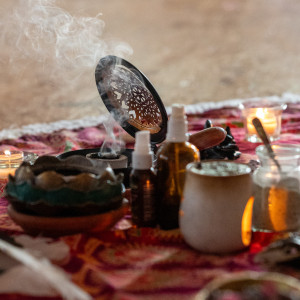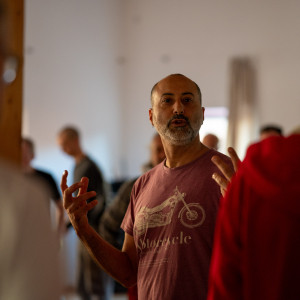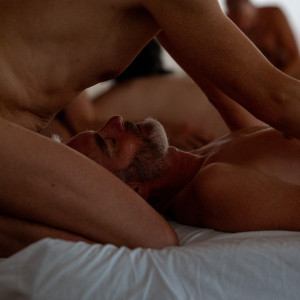Sleep Disruption
By Rabi Najara, 16th century — Translation by Moxe
My sleep is disturbed—
tormented in the sea of longing for you.
Still, I remember you:
my friend, my beloved, my praise.
If I were a newborn,
and you, my nursemaid,
I would drink from your breast,
quenching the thirst within.
My great friend,
my praiseworthy beloved.
If I were a spear
and you struck the hearts of your enemies,
I would be blessed by their blood.
My friend, my beloved.
If I were a tent,
and you chose to dwell within me,
love would caress us—
growing stronger with age.
My dearest one,
the beauty of my praise.
If I were a tongue,
and you, the body,
I would quiet my burning desire
through song and melody.
My beloved, my praise.
If I were a servant,
and you, my master,
I would long to serve you—
never seeking my freedom.
Touching her hand was intimacy.
We could no longer speak the same language, and where words couldn’t reach, this glassy, shiny skin moved as one across a landscape of purple veins. The brown spots shifted, changing their shapes and spaces. I stroked her hand—sometimes softly, sometimes firmly—from wrist to fingertip. It wasn’t sexual, but then again, I had no words for it. She allowed it. She surrendered to it.
The last time we met, I saw her melting into that touch—briefly—and then pulling her hand away. That’s when I knew she had given up on life. Soon after, she died.
Years later, a wise friend spoke to me about the eroticism in Jewish tradition—between the human and the Shekhinah, the feminine face of the divine. How seeing and not seeing, touching and not touching, discovering slowly and yearning deeply, create a sensation of holiness and passion: eroticism.

Eroticism is everywhere, yet most of us miss it, because we search for it only in physical encounters. But we don’t need a god to feel this energy. These bodily reactions aren’t just somatic—they connect us to emotion and yearning (a more abstract dimension of desire). For lack of a better word, we call it spiritual.
In moments of deep connection, intimacy, and openness, we can become one. This oneness is holy. Though the skin defines a clear border between one and another, there are precious moments when we melt into each other.
I call this space erotic—where intimacy merges with the sensual, friendship blends with bodily pleasure, and emotions give rise to touch, even when there is no physical contact.
Recently, I watched the film Queer. The director guides us into our collective queer past—into a monotheistic civilization that taught us to become disembodied. Our bodies were sinful, our feelings shameful, our yearnings impure. Whether we lived in sin or tried to transform desire into a hunger for God, we became disconnected from our bodies. We learned to mistrust them. To hate them.

In one scene, the drunken protagonist says to his non-lover: “I want to hug you without hands. Touch you without my body.”
But one thing survived: eroticism.
Seeing without looking.
Feeling without touching.
Yearning without desiring.
This bodily reaction to the unspeakable— Is it not divine?
Now that we have the time and space to heal, many in our community still avoid it. They run from abstract eroticism, unable to recognize intimacy.
But we can cultivate it—even with a partner.
Jewish tradition has many ritualistic rules around sexual interaction:
1. Monogamy—intimacy with one person, with oneness.
2. A period of no touch—allowing yearning and desire to rise.
3. Darkness—so you cannot see each other; mystery is essential to eroticism.
4. Intercourse with minimal physical contact—a biblical glory hole 😊

All of this aims at uniting souls, not just bodies. You don’t have to follow these practices, but you can play with them. Rules fit some people, not all.
So how do we consciously cultivate eroticism?
It begins within.
It’s already inside each of us.
We only need attention, willingness to connect, and the desire to become one.
Cultivating your sexuality is a spiritual practice.
And I can’t think of a more powerful path toward personal and spiritual growth than exploring joy, pleasure, and eroticism.
Moxe is the facilitator of our monthly Tantastic evenings in Barcelona, and one of the core guides at the Summer Evolution Festival and our annual Summer Retreat. He is also co-creator of the Eros Lab Teaser and the upcoming Eros Lab Training, where this kind of embodied erotic exploration meets deep personal transformation. We're honored to have Moxe as part of our team and excited to continue weaving these sensual, soulful conversations together.




